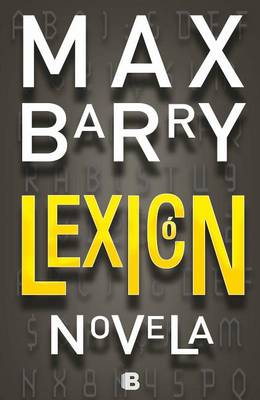Reviewed by Rinn on
I’ve received quite a few books from the wonderful Hodderscape recently, and I’m working my way through the pile. I started off with this particular book – and what a way to start!
The reader is immediately thrown into the action, with a scene where one of the two protagonists, Wil, is at the airport and gets waylaid by two strange men. They drug him, and he manages to make a run for it, but his sense of confusion and the frantic feeling of needing to get away now is so well conveyed. It doesn’t hold back on the swearing or coarse language, and you know from the get-go that these guys mean business. I found myself whizzing through the pages, needing to know what their motive was, and why they were targeting Wil in particular.
Well as it turns out, words are power. People who are trained in the use of words are known as ‘Poets’ (they use pseudonyms when working, the names of famous poets), and can use them to convince, coerce and control others. It’s not quite as simple as it sounds though: any old words won’t work on everyone. As well as digging into linguistics, the book explores psychology, in that everyone’s personality represents a different ‘segment’, of which there are over two hundred. To control someone, you need to work out which segment they are, and then use the appropriate words. And on top of this, the words need to be of their language to have the greatest effect, e.g. using English words on a French person would not be as successful as using French. However, there are a few words, know as ‘barewords’, which can affect anyone, and they are also incredibly powerful. Wil has a link to one of these ‘barewords’, which is why he is being hunted. I liked that Max Barry included all of these rules, it meant that although Poets had great power, there was some sort of restraint.
There is also a bit of a 1984 vibe in the book: the government and many companies record personal information (lots of excuses are given for reasons why they need to record various personal things e.g. terrorist attacks), which is then processed by Poets, allowing them to sort the population into segments. The information is then used (or rather, abused) by lots of people, including political parties who may go canvassing, and change their stance depending on who they are talking to. Most of this information was revealed in between chapters, through newspaper articles, emails, IM chats and forums. It felt a little set back from the main story, sort of added in to keep the reader informed. It was nice to have this background information, but I felt it might have worked a little better if it was somehow more integrated into the story.
My favourite chapters of the book were the ones that followed Emily. When the reader first meets her, she is a sixteen year old runaway, living on the streets and getting by on card and slight of hand tricks. She is approached by someone from the ‘Academy’ (the school where the Poets are trained) and is given a chance to improve her life. One of the entrance tests for the Academy includes trying to persuade people in the street to cross the road and talk to her – this was possibly one of my favourite scenes, just for its sense of humour, although one of Emily’s ‘methods’ seemed a bit ludicrous for a sixteen year old! I particularly enjoyed her chapters because they were generally the ones where the power of words was explored; as Emily learnt about the Poets and their power, so did the reader.
I’m not sure if it wasn’t too clear to begin with, or if I was just being slow on the uptake, but the stories of Wil and Emily are actually on two slightly different timelines. I was unsure at how they were going to weave together, but as I read more of the book the cogs started fitting into place and I loved trying to predict what was going to happen next.
I am so grateful that I was sent this book – I’d not heard of it before I received it, and I’ve not seen it on many other blogs or Goodreads, so it might have missed my attention otherwise! It is a wonderfully unique concept, and although some parts of the story (mostly Wil’s) were a little too slow moving, I devoured it in a matter of days. A definite recommendation for fans of cerebral thrillers, or people interested in linguistics and psychology.
Reading updates
- Started reading
- 20 May, 2014: Finished reading
- 20 May, 2014: Reviewed
